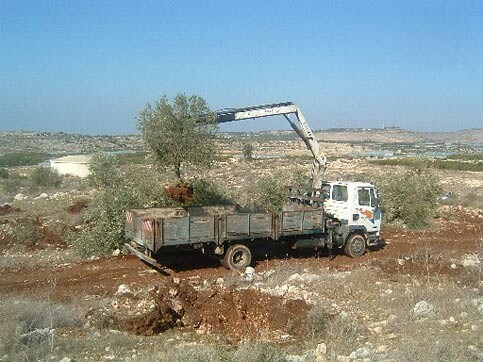The Electronic Intifada 21 January 2005

One of the 117 olive trees uprooted by Israel on 9 December 2004 in Jayyous. (Photo: Christoph Gocke)
The average American finds unfathomable the desperation that drives suicide bombers. Yet Israeli occupation of the West Bank and the Gaza Strip is a recipe for producing violence. It robs Palestinians of their livelihood, their dignity, and their faith in the future.
U.S. acquiescence in Israeli policies that render Palestinians’ lives untenable in order to force them off their land makes a mockery of Washington’s pretense at being an honest broker in this conflict. Across the Arab and Muslim world, suffering in the Occupied Territories provokes bitter hostility.
Local groups such as the Rhode Island Qalqilya Alliance (www.RIQA.info) are trying to sound the alarm about gross violations of human rights being carried out with American connivance in Palestine and to arouse elected officials to re-think U.S. policy in the region.
The village of Jayyous in the Qalqilya district is a microcosm of Israeli policy in the West Bank. It occupies some of the most fertile land and sits atop one of the richest aquifers in the area. Productive and self-sufficient, the residents and their ancestors had tilled this soil for hundreds of years before Israeli settlers began to eye their fields.
Curfews, border closings, checkpoints, home demolitions, land seizures, settlement building, and the “security” barrier known as the Wall have conspired to turn a thriving village into one in which half the population has been driven into exile since 1967. Of the remainder, 50% depend upon foreign aid for basic survival, and many families can not afford the equivalent of $10-12 per child for annual school fees.
Like the vast majority of Palestinians, Jayyous villagers have struggled valiantly by non-violent means to stave off Israeli annexation of their land. Abdul-Latif Khaled, local leader and hydrologist, has argued that “nonviolent protest is the most powerful and humanitarian tool in the struggle for freedom and democracy.” At points in the vicinity of Jayyous , the Wall penetrates as far as four miles into the Palestinian side of the Green Line or pre-1967 border.
The International Court of Justice ruled this summer that this barrier is illegal. The Sharon and Bush administrations sneered. The Wall separates the residents of Jayyous from their families, friends, fields, markets, hospitals, schools - in short, from their normal lives and livelihoods. It snakes across the landscape in a pattern that dispels any notion that its purpose is security. In fact, it is little more than camouflage for land-grabs. As Sharif Omar, a local farmer and community leader, lamented, “The wall is an unwritten order for emigration from Palestine because people who have no income will have no choice but to leave.”
Malnutrition among children is rising, education is falling, despair is simmering. Through fund-raising to subsidize school fees and books and efforts to sell Palestinian goods in Rhode Island, RIQA has been attempting to provide concrete and moral support. But these are stop-gap measures.
The most recent outrage began in late 2004 when Israeli bulldozers lumbered into Jayyous and began razing crops to clear land for expansion of the neighboring Israeli settlement of Zufim. In a single day in early December, 117 ancient olive trees were ripped from the ground. The bulldozers reappeared on subsequent days to continue their assault. Steven Erlanger reported in the New York Times on 29 December that 650 trees, many of them 600 years old, had been uprooted. For the farmers whose livelihood depends upon olives, this is a catastrophe.
Thanks to grass-roots contacts among people in the West Bank, Israel, the United States, Western Europe, and Japan, information about the crisis has reached politicians and the international media. On 31 December hundreds of Israeli and international peace activists joined local residents to plant olive saplings in the same fields from which venerable trees had been torn. Rhode Islanders mobilized by RIQA have prodded state representatives. Senator Lincoln Chafee has written a letter conveying his constituents’ concerns to William Burns, Assistant Secretary of State for Near Eastern Affairs; Senator Jack Reed has requested clarification of the situation in a note to Secretary of State Colin Powell; and Representative Patrick Kennedy has made an inquiry.
RIQA is urgently raising contributions for a legal defense fund for Jayyous farmers.
American tax dollars help buy the Caterpillar equipment that destroys lives as it uproots trees. The U.S. belatedly intervened to halt ethnic cleansing in the Balkans. In Palestine it acquiesces, even collaborates, in policies that drive people from their land. Why the double standard?
The rest of the world will never believe that the U.S. is trying to nurture democracy in Iraq while it sits idly by as Israel deprives Palestinians of their most basic human rights. Americans are becoming increasingly aware of what is being done and of how their government and their taxes are facilitating it.
At some point, our sense of fair play should reassert itself; let’s hope before the Palestinian village of Jayyous disappears.

The first olive tree is put onto an Israeli lorry. The driver says he will bring the trees to the Tel Aviv area, to be sold. (Photo: Christoph Gocke)
Priscilla Read is an educator and resident of Providence, Rhode Island. An earlier version of this piece appeared in the Providence Journal (Rhode Island) on Friday, 14 January 2005 under the title “U.S. Should Help Stop Israeli Land Grabs”.

